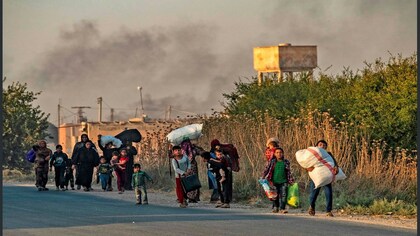How Iran Nuclear Standoff Looks From Saudi Arabia
20:09 - 16 February 2012

The most likely victims of a nuclear armed Iran are not the U.S. or Israel, but the Gulf states -- countries that are engaged in intense competition with the regime in Tehran, but that lack the power to deter any threat or aggression with a nuclear-strike capability of their own.
That, at least, is how it looks from Riyadh and other Gulf capitals. Saudi Arabia has kept a low public profile amid the heated international debate regarding the nature and ultimate objectives of the Iranian nuclear program, and the country isn’t yet ready to back a military strike. But that reticence hides deep and genuine concern, demonstrated by the speed with which Saudi Arabia and the United Arab Emirates pledged to fill any shortfall in global oil supplies that planned European Union sanctions on Iran’s energy exports may cause.
A complete EU boycott of Iranian oil would result in the disappearance of about 2.5 million barrels per day from the international oil market, driving up prices sharply and damping the global economy as it struggles to escape a slump.
To start with, the Saudis strongly believe that if Iran is able to militarize its nuclear program while it remains a signatory to the 1968 Treaty on the Non-Proliferation of Nuclear Weapons, or NPT, this would render the treaty worthless. The likely Saudi response would be to seek a nuclear capability of its own.
The Nuclear Path
Saudi and other Gulf country officials have made this point clear to Western governments, though not in public. They have told their Western counterparts that if Iran acquires a nuclear weapon, they would feel themselves under no legal or moral obligation to adhere to the treaty’s principles. In other words, they would be free to go down the nuclear path. From the Saudi point of view, the success or failure of the international community in restraining Iran’s nuclear program will determine whether the global nonproliferation regime survives.
Nor do the Saudis distinguish between Iran acquiring nuclear capability and actually producing the bomb. In their view, an unassembled nuclear weapon on the shelf is no less dangerous and intimidating than a completed one in storage.
The dominant feeling in the Gulf region is that U.S. policy, wittingly or unwittingly, has gifted Iran with painless and costless strategic gains over the past decade. When the U.S. removed the Taliban from power in Afghanistan and then toppled Saddam Hussein’s Baath regime in Iraq, it lifted what had been for Iran a state of siege and containment, imposed by the two hostile regimes on its long eastern and western borders. U.S. mishandling of the postwar situations in Afghanistan and Iraq handed a further bonus to Iranian policy.
Iran’s release from that vise is worrying to Saudi Arabia and other Gulf nations because they believe their Persian neighbor represents a hegemonic state that is attempting to implement aggressively interventionist and potentially expansionist policies. So far, these policies have successfully established states-within-a-state in both Lebanon and Iraq. Iran is now vigorously trying to repeat those experiences in other Arab countries that have Shiites among their populations.
Iran’s expansionist goals are exemplified in the occupation of three islands in the Gulf that belong to the UAE. Second-tier Iranian officials in recent years have also begun to revive Iran’s territorial claim to Bahrain. In addition, Iran has threatened repeatedly to “punish” the Gulf states and to close the Strait of Hormuz, an important international waterway for global oil supplies.
Iran as Troublemaker
The perception within this region is that Iran without nuclear capability is a troublemaker and that with a nuclear bomb it would probably become still more aggressive and irresponsible. From the Saudi perspective, Iran doesn’t need nuclear weapons for deterrence because, like other states in the region, it doesn’t face a nuclear threat. Israel, Pakistan and India, of course, all have nuclear weapons, but in the Saudi view these countries do not pose an offensive threat. Israel, for example, has a well-established superiority in conventional weapons and therefore does not depend on nuclear deterrence. Only as a state that has hegemonic aspirations and a misguided superiority complex would Iran need the bomb.
Since 2003, when Iraq ceased to be an effective regional counterweight to Iran, the Gulf states have invested heavily in high-tech conventional-weapons systems in an effort to redress the regional military imbalance. A nuclear Iran would make those acquisitions moot, upsetting the delicate regional equilibrium. That would be a new ballgame that none of the Gulf states feels equipped to handle.
Saudi Arabia and its neighbors have no specific vision for how to deal with the issue of Iran’s nuclear program. At this point, they don’t favor a military option. They want first to see serious and effective non-military pressure on Iran intensified in quality and quantity. Should these measures fail to halt Iran’s progress toward the bomb, the Gulf states would reluctantly support military action, despite all its negative consequences for the region.
If Iran is determined to militarize its nuclear program at any cost, they reason, then the international community must be equally determined to prevent that outcome at any cost. Otherwise, the entire Gulf region would go nuclear.
By Mustafa Alani
Source - Bloomberg
That, at least, is how it looks from Riyadh and other Gulf capitals. Saudi Arabia has kept a low public profile amid the heated international debate regarding the nature and ultimate objectives of the Iranian nuclear program, and the country isn’t yet ready to back a military strike. But that reticence hides deep and genuine concern, demonstrated by the speed with which Saudi Arabia and the United Arab Emirates pledged to fill any shortfall in global oil supplies that planned European Union sanctions on Iran’s energy exports may cause.
A complete EU boycott of Iranian oil would result in the disappearance of about 2.5 million barrels per day from the international oil market, driving up prices sharply and damping the global economy as it struggles to escape a slump.
To start with, the Saudis strongly believe that if Iran is able to militarize its nuclear program while it remains a signatory to the 1968 Treaty on the Non-Proliferation of Nuclear Weapons, or NPT, this would render the treaty worthless. The likely Saudi response would be to seek a nuclear capability of its own.
The Nuclear Path
Saudi and other Gulf country officials have made this point clear to Western governments, though not in public. They have told their Western counterparts that if Iran acquires a nuclear weapon, they would feel themselves under no legal or moral obligation to adhere to the treaty’s principles. In other words, they would be free to go down the nuclear path. From the Saudi point of view, the success or failure of the international community in restraining Iran’s nuclear program will determine whether the global nonproliferation regime survives.
Nor do the Saudis distinguish between Iran acquiring nuclear capability and actually producing the bomb. In their view, an unassembled nuclear weapon on the shelf is no less dangerous and intimidating than a completed one in storage.
The dominant feeling in the Gulf region is that U.S. policy, wittingly or unwittingly, has gifted Iran with painless and costless strategic gains over the past decade. When the U.S. removed the Taliban from power in Afghanistan and then toppled Saddam Hussein’s Baath regime in Iraq, it lifted what had been for Iran a state of siege and containment, imposed by the two hostile regimes on its long eastern and western borders. U.S. mishandling of the postwar situations in Afghanistan and Iraq handed a further bonus to Iranian policy.
Iran’s release from that vise is worrying to Saudi Arabia and other Gulf nations because they believe their Persian neighbor represents a hegemonic state that is attempting to implement aggressively interventionist and potentially expansionist policies. So far, these policies have successfully established states-within-a-state in both Lebanon and Iraq. Iran is now vigorously trying to repeat those experiences in other Arab countries that have Shiites among their populations.
Iran’s expansionist goals are exemplified in the occupation of three islands in the Gulf that belong to the UAE. Second-tier Iranian officials in recent years have also begun to revive Iran’s territorial claim to Bahrain. In addition, Iran has threatened repeatedly to “punish” the Gulf states and to close the Strait of Hormuz, an important international waterway for global oil supplies.
Iran as Troublemaker
The perception within this region is that Iran without nuclear capability is a troublemaker and that with a nuclear bomb it would probably become still more aggressive and irresponsible. From the Saudi perspective, Iran doesn’t need nuclear weapons for deterrence because, like other states in the region, it doesn’t face a nuclear threat. Israel, Pakistan and India, of course, all have nuclear weapons, but in the Saudi view these countries do not pose an offensive threat. Israel, for example, has a well-established superiority in conventional weapons and therefore does not depend on nuclear deterrence. Only as a state that has hegemonic aspirations and a misguided superiority complex would Iran need the bomb.
Since 2003, when Iraq ceased to be an effective regional counterweight to Iran, the Gulf states have invested heavily in high-tech conventional-weapons systems in an effort to redress the regional military imbalance. A nuclear Iran would make those acquisitions moot, upsetting the delicate regional equilibrium. That would be a new ballgame that none of the Gulf states feels equipped to handle.
Saudi Arabia and its neighbors have no specific vision for how to deal with the issue of Iran’s nuclear program. At this point, they don’t favor a military option. They want first to see serious and effective non-military pressure on Iran intensified in quality and quantity. Should these measures fail to halt Iran’s progress toward the bomb, the Gulf states would reluctantly support military action, despite all its negative consequences for the region.
If Iran is determined to militarize its nuclear program at any cost, they reason, then the international community must be equally determined to prevent that outcome at any cost. Otherwise, the entire Gulf region would go nuclear.
By Mustafa Alani
Source - Bloomberg



